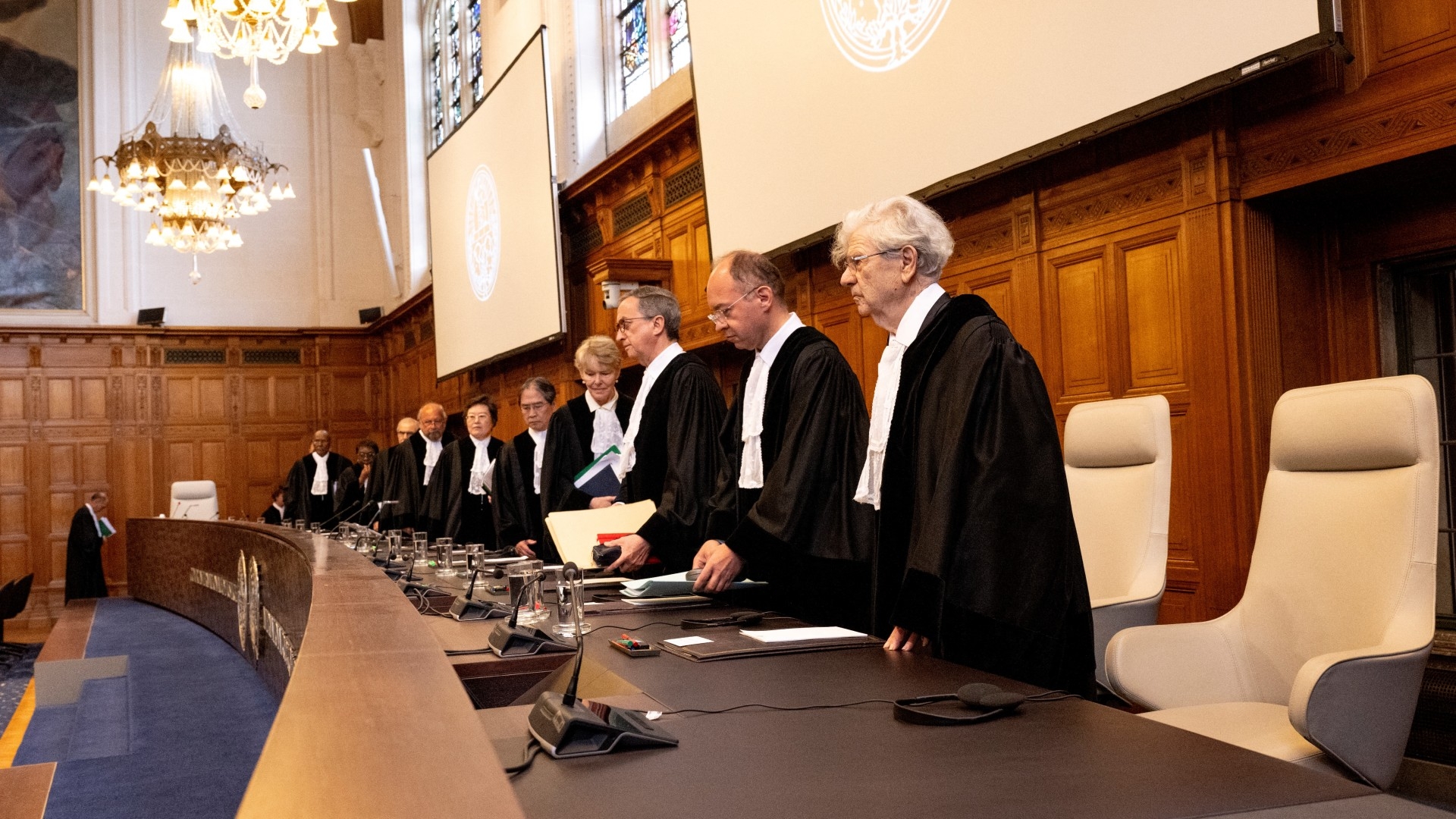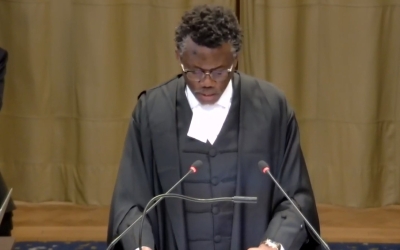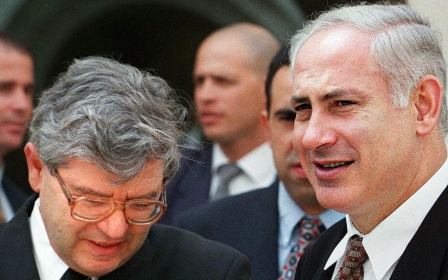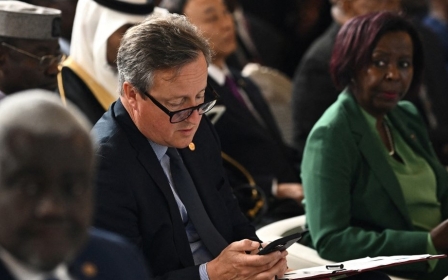Ron Shapira: Israel's underqualified right-wing pick for ICJ

Combative, comparatively inexperienced and supportive of Benjamin Netanyahu's highly controversial judicial reforms, Israel's pick for its new ad hoc judge in South Africa’s genocide case at the International Court of Justice (ICJ) has raised eyebrows.
Ron Shapira will replace Aharon Barak, who vacated his role last month due to “personal family reasons”.
In addition to the 15 judges on the permanent panel, the two parties to a case at the ICJ can nominate a judge to participate in deliberations.
In late January, the ICJ delivered an interim ruling calling on Israel to take measures to prevent acts of genocide in the Gaza Strip.
Only two judges in the 17-member panel issued dissenting judgements: Barak and Ugandan judge Julia Sebutinde.
New MEE newsletter: Jerusalem Dispatch
Sign up to get the latest insights and analysis on Israel-Palestine, alongside Turkey Unpacked and other MEE newsletters
Shapira, who is set to take Barak's place, is currently the rector of the Peres Academic Center, a private college in central Israel, and a lecturer at Bar-Ilan and Tel Aviv universities.
He also serves on the advisory committee of the Israel Law and Liberty Forum, a right-wing organisation that trains conservative judges and legal professionals.
‘ICJ unworthy of trust’
Analysts have noted that Shapira’s judicial credentials do not compare to those of Barak, a former attorney general who served on Israel’s High Court for three decades, including 11 years as its president.
“While he may be highly accomplished in his areas of specialisation, he has nothing remotely resembling Barak’s status as a jurist, certainly amongst the ICJ judges and other international lawyers,” Eitan Diamond of the Diakonia International Humanitarian Law Centre in Jerusalem told Middle East Eye.
“Barak is perhaps the most prominent jurist in Israel’s history, and he has extensive experience in adjudicating cases relating to matters of international law.”
Diamond added that Barak’s expertise, along with elements of his biography (such as being a Holocaust survivor), may have added “extra weight in the wider legal and public discourse surrounding the case”.
'While he may be highly accomplished in his areas of specialisation, he has nothing remotely resembling Barak’s status'
- Eitan Diamond, Diakonia International Humanitarian Law Centre
Meanwhile, Shapira is inexperienced in the international arena and deeply critical of the ICJ.
In January, Shapira said that Israel had sent Barak to serve as a judge on “a body that almost all Jewish residents of the state of Israel and its entire political leadership deem to be unworthy of any degree of trust”.
Shapira continued: “The consensus in Israel is that this body illustrates and amplifies all the flaws of the legal discourse, wherever it may be - intellectual dishonesty, manipulative use of ambiguous definitions, overly clumsy tools for fact-checking and refuting lies and disguising the judges' own external interests in words that give a false impression of neutrality.”
For Diamond, Shapira's appointment reveals Israel’s approach towards the case brought by South Africa.
“By selecting an ad hoc judge who is not an international lawyer and who has been openly antagonistic towards the ICJ, Israel seems to have given up on any hope of exerting influence over the court’s decisions in the case,” he said.
Neve Gordon, an Israeli professor of international law and human rights, told MEE Israel had deployed a number of measures to "undermine the very architecture of the international legal order", including by intimidating prosecutors at the International Criminal Court.
"Now, with its decision to send Ron Shapira, it has decided to dispatch a troll to the highest court in the land," Gordon said.
"Shapira, who has criticised the very legitimacy of the ICJ and indeed the international legal order, is now expected to provide fair judicial review of Israel’s alleged perpetration of genocide.
"If this weren’t real, I would think it is a bad joke."
Supporter of judicial reforms
Shapira is an outspoken judicial practitioner who frequently shares his thoughts on legal and political matters with his 869 followers on Facebook and regularly appears in Israeli media.
The incoming judge has backed elements of Prime Minister Benjamin Netanyahu’s judicial reforms, which have led to months of protests, with much of the public seeing the scheme as a dismantling of Israeli democracy.
The reforms aimed to give the government the power to appoint judges and allow a simple parliamentary majority to cancel judgements by the High Court.
In an interview with Israel National News, Shapira said the country was in need of judicial reforms.
“Almost nowhere else do courts have the authority to overturn laws while judicial appointments are not under the control of the political system,” he said.
“A judge [in Israel] is not chosen by the public, not directly or indirectly… That isn't an accepted system in western countries.”
Barak, on the other hand, strongly opposed Netanyahu’s judicial overhaul, earning him praise among opposition circles and criticism from the far right. Since his retirement, he has built a domestic reputation as a liberal judge and champion of democracy.
However, on the matter of crimes against Palestinians, Barak has long been accused of being a liberal face “whitewashing and legitimising” Israeli crimes during his time presiding over the High Court.
These crimes include the legitimisation of the construction of a separation wall between Israel and the occupied West Bank, the expropriation of Palestinian land to serve Israeli settlers and targeted assassinations carried out by Israel's military.
“Perhaps unsurprisingly, [Barak] voted in the different stages of the South Africa v Israel case in a way that might appear to be politically biased and in support of Israel,” Christian Henderson, professor of international law at the University of Sussex, told MEE.
“It's not clear yet whether Shapira will take a very different position... but I'd imagine that things will continue as they have done with Barak.”
Middle East Eye delivers independent and unrivalled coverage and analysis of the Middle East, North Africa and beyond. To learn more about republishing this content and the associated fees, please fill out this form. More about MEE can be found here.





